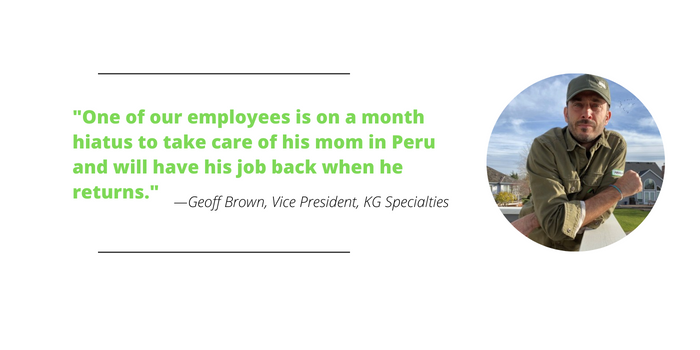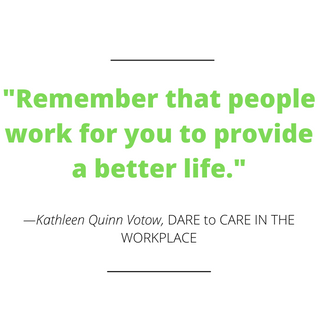How Promo Companies’ Policies Can Improve Employees’ Lives

Any company, across all industries, that had been taking its employees for granted has likely been in for a rude awakening recently. A lot has been made of The Great Resignation, but as the New York Times reported in May, many of those workers who left jobs in record numbers over the past year were not doing it out of any sort of laziness or entitlement; they were actually leaving their jobs for higher paying, more flexible roles elsewhere.
Skilled workers have options, and in our current moment of economic instability and high prices, they are less likely to linger in a job that is not meeting their needs. Referencing inflation, Dan Price, co-founder and CEO of Gravity Payments tweeted out in April, “Apparently a lot of bosses need to hear this: If you’re giving out a 5% annual raise right now, you’re giving out a pay cut.”
But competitive salaries are not the only way to retain (and attract) talent. Operations and human resources leaders from the promotional products industry have offered PPAI Media direct feedback about their benefits packages. Today we dig into some of those companies’ more creative approaches to making sure their employees truly are benefiting.
“Remember people work for you to provide a better life,” says Kathleen Quinn Votaw, CEO of TalenTrust and author of DARE to CARE IN THE WORKPLACE: A Guide to the New Way We Work.
So, what can companies do to make their workers’ lives better? Take the subject of paternity leave, for instance. Votaw asks companies, “What do you think is fair and reasonable? What would you prefer if you welcome a new child into your home?”

Below are some ideas brought by industry companies who have found successful benefit packages, not necessarily because they know better, but because they were willing to listen to their employees, try unique approaches, and understand benefits are an ever-evolving concept.
Ask Employees What Matters To Them
It’s important to remember who benefits are for. They’re not for customers. They serve the purpose of helping employees outside of their work. So, you don’t want benefits to resemble a steadfast set of office rules. Even a company that excels at pleasing employees should welcome feedback. Having a voice in both how the company operates and how it treats its employees is something many workers value.
“We take part in employee engagement surveys at our office and have used that to help shape how we run our business,” says Britt Chavers, human resources coordinator at Goldner Associates. “At Goldner, we really value our employee’s voices and opinions. We incorporate all our employees across the U.S. to create an inclusive and empowering environment.”
Online tools such as SurveyMonkey, Google Forms, and HubSpot provide great platforms to get started initiating employee feedback on a topic that might not already have a system in place. Whether it results in a direct resolution to an issue, or a reference to compile over years to avoid future mistakes, listening to employees will never stop benefiting a company.
Recognize Benefits As A Competitive Advantage
As a relatively small distributor, Oregon-based KG Specialties can’t compete in size or revenue with some of the industry’s largest operations, which makes what each employee offers the company all the more valuable. According to Vice President Geoff Brown, they are made to feel as such. “We are not the largest,” Brown says. “But we are family.”
A smaller company will have less communication hurdles than larger ones do, and if approached correctly, that can allow workers a flexibility that might make them feel less confined by their jobs.
“One of our employees is on a month hiatus to take care for his mom in Peru and will have his job back when he returns,” Brown says.
To feel valued is crucial, but to feel trusted is a step employees want to see taken by their employer. It even applies to work-from-home or other company policies. Employees will make note of any policy that implies that their company does not trust them to do the work expected of them. A culture of trust and flexibility can keep a worker from being lured away.

Connect From Afar
According The Conference Board’s Reimagined Workplace survey, only 4% of companies surveyed are requiring all workers to return to the office full-time.
San Jose, California-headquartered distributorship BrandVia Alliance has maintained a hybrid work environment that allows employees to work from home based on role and preference, and Human Resources Manager Melissa Slattery says, “Without this flexibility, I think we would lose a portion of our workforce, so it is a necessary change.”
For some industry companies, especially supplier that will need producers on hand to create products, remote work isn’t a real possibility. But many of the companies that can are implementing as much flexibility as possible, which is its own kind of concession to employees. But will most companies stop at that concession or brainstorm how to replicate some of the creativity that may come from having everyone working at the same place?
Although based in Los Angeles, distributor BAMKO has accepted that the majority of its employees are remote, and the company is focused on creating employee engagement within that reality. “We send regular themed care packages in the mail,” says Stephanie Bass, the company’s director of global human resources. “They have ranged from workout goods, to PPE to relaxation kits.”
Beyond gifts, BAMKO wants to provide possibilities of personal fulfilment or positive distraction. “We host various virtual events,” Bass says. “Weekly department meetings, monthly team events, and quarterly company update meetings. Some of our most notable team events have included a wellness coach, a magician, Pictionary and a family feud tournament.”
Helping Employees Is Holistic
Salary and traditional benefit packages (such as medical coverage and retirement planning ) are not perks to today’s workforce. They are starting points. From there, the possibilities are endless, and they will vary from company to company as leaders listen to their employees. There’s nothing wrong with following a competitor’s successful benefits package, just as there is nothing wrong with being innovative, as long as the goal is to improve the lives of employees.
Employee recognition awards and acknowledgments are important, but so is substantial help to make sure employees aren’t hiding stress from work or life.
“We have an employee assistance program that includes counseling sessions,” says BrandVia’s Slattery.
Supplier Cap America offers a tuition reimbursement program for employees and scholarship program for dependent children of employee, according to Sarah Burgin, vice president of human relations. There is also a Cap America gym located onsite and available for all employees.
The benefit options employers could offer will always evolve. But it’s clear that the more generous the benefits, the more employees a company will draw. In today’s economic landscape, skilled workers know their worth. They will go where they’re valued.
“The Great Resignation is about the power of choice,” Votow says.

